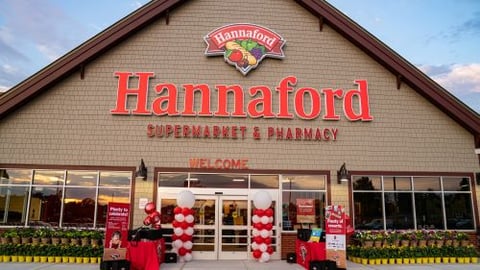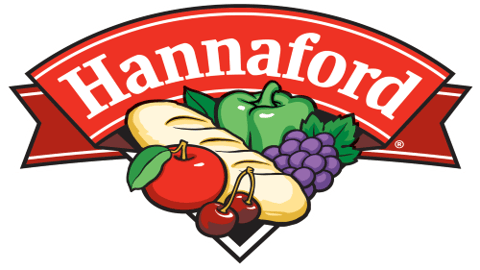Hannaford’s Gleaning Efforts Support Local Agriculture, Hunger Relief
Demonstrating its continued commitment to supporting sustainability and hunger relief, Hannaford Supermarkets and the Hannaford Charitable Foundation have donated $350,000 to help expand gleaning efforts and raise awareness of the fresh food harvesting process throughout New England and New York.
The donation will support the work of gleaning networks and organizations to harvest and recover excess produce from local farms that would otherwise go to waste. The food will be delivered directly to area food pantries to provide individuals in need with increased access to healthy, fresh and locally grown food.
“Gleaning programs are a critical part of our food system that equally support such important pillars of our industry as agriculture, sustainability and hunger relief,” the company said in a statement. “Hannaford is excited to help these organizations enhance their programs, which ensure that nutritious produce that would otherwise go to waste reaches individuals in need while increasing both the amount and variety of fresh, local food available at pantries. We look forward to seeing these programs grow in the years to come as our communities become more familiar with the gleaning process and its important role in the agriculture cycle.”
The five gleaning networks benefiting from the donation last year recovered more than 1.9 million pounds of produce from a total of 500 partner farms and served 691 food pantries during the 2020 gleaning season, which runs annually from approximately late June through early November.
This year’s $350,000 donation will be distributed to gleaning networks in New England and New York as follows:
$100,000 to Vermont Gleaning Collective: Comprising seven regional gleaning initiatives that work collaboratively as a statewide partnership of autonomous, community-based programs, including Salvation Farms in Morristown, the Vermont Gleaning Collective will use the funding to expand its reach and capacity by making investments in cold storage, trucks and staff — all of which will increase the collective’s ability to collect, temporarily store perishable food gleaned from participating farms, and transport it to food pantries in remote and rural areas of the state. Funds will also be used to build communication, collaboration and connectivity among the member programs of the Vermont Gleaning Collective.
According to the Vermont Gleaning Collective, 87% of food recipient sites surveyed reported that receiving gleaned produce increased their understanding of, and familiarity with, locally grown in-season produce; while 86% of farms surveyed indicated that the gleaning program helped to reduce their on-farm food loss.
$75,000 to Boston Area Gleaners, in Massachusetts: The donation from Hannaford will be used to upgrade a cold-storage unit at Stonefield Farm, in Acton, Mass., which is the new permanent home for Boston Area Gleaners. The new site provides Boston Area Gleaners with 20 acres of agricultural land, allows the organization to operate year-round, reduces travel miles to farms by 40%, offers cold and dry storage, and increases food distribution by an estimated 4.5 million pounds over the next three to five years. The land will also be used to grow culturally appropriate crops for hunger relief and support emerging farmers. Over the past decade, Boston Area Gleaners has captured and distributed more than 10 million pounds of nutritious food for food-insecure families, working in collaboration with 550 hunger relief agencies, 80 farms and orchards, and 2,000 volunteers
$75,000 to Cornell Cooperative Extension, in New York: Cornell Cooperative Extension will use the funding to purchase new cold-storage units, which will help extend the life of gleaned produce and expand the program’s capacity to collect excess produce during the end-of-season harvest, while also supporting the refrigeration needs of partner food pantries. Additionally, the cold-storage unit will allow Cornell Cooperative Extension to partner with food access organizations that are packaging and freezing portions of gleaned produce for distribution to individuals in need, thereby increasing access to fresh, healthy food during the winter months.
$60,000 to the UMaine Extension: The UMaine Extension will use the funding to pilot programs designed to increase access to fresh locally grown food and vegetables for community members experiencing food insecurity by expanding gleaning to new parts of Maine and increasing the organization's frequency and capacity at existing locations.
Since its inception, Harvest for Hunger, the extension’s grass-roots effort to encourage gardeners, farmers, businesses, schools and civic groups to donate high-quality fruits and vegetables to citizens in need, has donated more than 3.1 million pounds of produce to food pantries, soup kitchens, community meals and individuals across the state.
$40,000 to NH Gleans, in New Hampshire: NH Gleans, which coordinates and supports a statewide network of regional gleaning leaders, will use the funding to raise awareness of gleaning in New Hampshire and increase access to fresh locally grown food and vegetables for food-insecure individuals. The organization has experienced an increase in both public interest and gleaning production over the past year, with the total number of volunteers and pounds of produce gleaned up approximately 50% over 2020.
As for its own operations, Hannaford said in April that each of its stores donates or diverts all food at risk of going to waste, sending no food at all to landfills.
Each Hannaford store strictly follows the U.S. Environmental Protection Agency Food Recovery Hierarchy, which prioritizes the rescue of surplus product for donation to food-insecure individuals, generating millions of meals donated annually. Other key elements of Hannaford’s food waste diversion program include donations to local farmers for animal feed and food-to-energy conversion efforts.
Hannaford’s adherence to this process kept 65 million pounds of food waste from reaching landfills in 2020. The chain's stores donated more than 25 million pounds of food to local hunger relief organizations last year.
Scarborough, Maine-based Hannaford operates 184 stores in five Northeast states, employing nearly 30,000 associates. Parent company Ahold Delhaize USA, a division of Zaandam, Netherlands-based Ahold Delhaize, is No. 10 on The PG 100, Progressive Grocer’s 2021 list of the top food and consumables retailers in North America.






